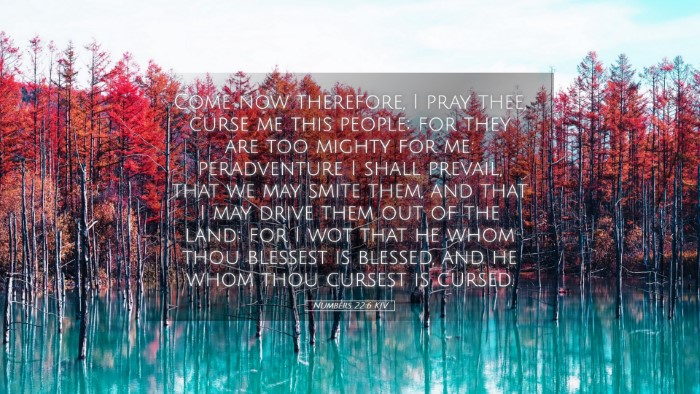Commentary on Numbers 22:6
In this verse, we encounter Balak, the king of Moab, who seeks the assistance of Balaam, a renowned prophet, to curse the Israelites. The context of this scripture is pivotal, as it reflects the ongoing tension between Israel and the surrounding nations. Balak's urgent request illustrates the apprehension felt by Moab concerning the burgeoning power of Israel.
Contextual Background
The Israelites, having been freed from Egyptian bondage, are making their way to the Promised Land. They pose a significant threat to the stability and prosperity of Moab. Balak's fears are legitimate, seeing that Israel has recently defeated other surrounding nations.
- Historical Overview: In the historical context, Israel's journey through the wilderness was marked by numerous difficulties, miraculous interventions from God, and victories over adversaries. This journey is crucial for understanding the mindset of Balak.
- The Role of Balaam: Balaam is depicted as a figure who possesses a unique connection with the divine, yet his motives and character reveal a complex interplay of piety and greed.
Theological Insights
This verse reveals important theological themes that resonate through scripture:
- The Power of Blessing and Curse: The action of Balaam is pivotal. He has the power to bless or curse based on his relationship with God. This reflects the larger biblical theme of blessing versus curse, which is a common motif throughout Scripture.
- God's Sovereignty: Despite Balak’s request to curse Israel, God's sovereignty is evident in how He protects His people. Numbers 22:6 is integral to understanding that God’s plans cannot be thwarted by human efforts.
- Influence of Foreign Entities: Balak represents the external pressures and influences that threaten the integrity of Israel. It challenges readers to consider modern applications regarding external pressures faced by faith communities today.
Commentarial Insights
Matthew Henry
Matthew Henry emphasizes the foolishness of Balak’s thoughts about cursing a people whom God has blessed. Henry argues that the desire to oppose God’s chosen people is ultimately fruitless. He draws a parallel between Balak's actions and the contemporary challenges believers face from external forces.
Albert Barnes
Albert Barnes provides a detailed analysis of Balak's fear and the rationale behind his request. Barnes notes that Balak believed that cursing Israel would provide him with a military advantage. He stresses that this perspective underlines a misunderstanding of spiritual authority, which cannot simply be invoked for personal gain.
Adam Clarke
Adam Clarke advises readers to recognize the significance of Balaam's role within this narrative. Clarke discusses the moral implications of Balaam’s willingness to engage with Balak, highlighting the contrasts in Balaam’s character—his prophetic gifts juxtaposed with his susceptibility to greed and fame.
Application for Pastors and Theologians
This verse prompts several crucial applications for pastors and theologians:
- Reflection on Blessings: Understanding that we are blessed as God’s people should fuel our confidence and resolve in the face of opposition.
- Ethical Decision Making: Analyzing Balaam’s choices provides a cautionary tale about motives in ministry. It encourages leaders to reflect on their own motivations and the potential for corruption.
- Response to Opposition: The narrative teaches that reliance on God’s promises is essential, urging believers to trust divine protection over fear of human opposition.
Conclusion
In conclusion, Numbers 22:6 encapsulates a significant moment that resonates with themes of fear, divine blessing, and human agency. The interplay between Balak and Balaam serves as a reminder of God’s sovereignty and the ultimate futility of opposing His will. As students of Scripture reflect on this passage, they are encouraged to explore these themes deeply, drawing connections to contemporary faith experiences and challenges.


